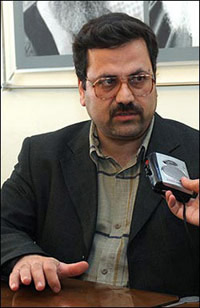Rationalization of Oral History Books (part II)
Rationalization Represents the Mastery of Compiler over Text
Akram Dashtban
Translated by: Fazel Shirzad
2018-5-29
Note: Following report is based on an invitation in which history experts are asked questions about oral history. In this regard, one of experts, as his perspective, has answered to one of questions titled "The amount of rationalization and appendix in oral history books". We'll read these comments as follows.
Mohammad Javad Moradinia, general director of Office for the Development of Books and Reading Books of the Ministry of Culture and Islamic Guidance and the director of Oral History Two-Quarterly, commented oral history site of Iran about rationalization of oral history's texts.

He spoke about the amount of rationalization and appendix in oral history books: As title showed, rationalization is an introduction of names, places, historical phenomena, the name of book, and so on, which is ambiguous to addressee, and compiler bring explanation, based on valid documentation and references, in the footnotes of book.
Moradinia continues to state that there is no different between definition of rationalization in oral memory and oral history, and added: Although this two formats are distinct in definition, author uses the technique of rationalization in the compilation of work when s/he encounter with ambiguous and unknown terms.
Saying about functions of rationalization, he added: The rationalization of text shows that the compiler of book has mastered on it and has worked hard to make the text a useful and effective one. Otherwise, it eliminates the ambiguities of text and converts a work from an early to polished one, and becomes closer to a research work.
The director of Oral History Two-Quarterly said about weak points that threatens rationalization of oral history: If a text selected for rationalization is not documented or ambiguous, it will add disadvantages to book. It is not supposed to make topics more obscure by rationalization in book. If compiler has encountered with a name in narration and cannot explain it well or does not have a reliable explanation for information which he provided, s/he only adds to shortcomings of effect.
The proper extraction of content is related to interviewer, if interviewer submits subject in ambiguous or summary terms, this is the art of interviewer to keep interview climate, hold the dialogue, then ask questions and take answers and rationalized text. It is not necessarily supposed that rationalization and explanations are brought in the text only compiler.
Moradinia explained about the amount of rationalization: The amount of rationalization should be concise and useful and should not overcome the text; a line, for example, should not be explained in twenty lines. This is the art of author and compiler to state readers, what they intended, with minimal words and sentences and does not exceed its limits.
Iranian oral history website asks question to experts about oral history, and publish responses to readers. Total responses will have remarkable results. If you have any questions, please feel free to submit it via this page to read comments from experts of oral history!
Number of Visits: 4821








The latest
- The Embankment Wounded Shoulders – 14
- An Eternal Lie!
- The 368th Night of Remembrance – Part 2
- Agents in Search for the Fighter
- The Embankment Wounded Shoulders – 13
- The Necessity of Standardizing Oral History and Criticism of General Mohsen Rezaei
- The 368th Night of Remembrance – Part 1
- Oral History News of Khordad 1404 (May 22nd – June 21st 2025)
Most visited
- Oral History News of Khordad 1404 (May 22nd – June 21st 2025)
- Najaf Headquarters Human Resources
- The Necessity of Standardizing Oral History and Criticism of General Mohsen Rezaei
- The 368th Night of Remembrance – Part 1
- The Embankment Wounded Shoulders – 13
- Agents in Search for the Fighter
- An Eternal Lie!
- The 368th Night of Remembrance – Part 2
How to send Imam's announcements to Iran
In the first part, the issue of funds, Hajj Sheikh Nasrallah Khalkhali - who represented most of the religious authorities - was also the representative of Imam. In Najaf, there was a money exchange office that cooperated with the money exchange offices in Tehran. Some of the funds were exchanged through him.Operation Beit al-Moqaddas and Liberation of Khorramshahr
After Operation Fat’h al-Mobin, we traveled to Kermanshah and visited Sar-e-Pol-e-Zahab before heading to Ilam. During Operation Beit al-Moqaddas, the 27th Brigade was still receiving support from the West. We maintained contact with individuals who had previously worked in Area 7 and were now leading the brigade. It was through these connections that I learned about Operation Beit al-Moqaddas.Memoirs of Hujjat al-Islam Reza Motalebi
Hujjat al-Islam Reza Motalebi is a cleric from Isfahan. Before the revolution, he was the imam of the Fallah Mosque – which was later renamed Abuzar Mosque. By his presence and efforts, Abuzar Mosque soon became a base for supporters of the Imam and the revolution. After the victory of the revolution, he played a role in uniting forces and maintaining political vitality in southwest Tehran.The Necessity of Receiving Feedback in Oral History
Whenever we engage in a task, we naturally seek ways to evaluate our performance — to correct shortcomings and enhance strengths. Such refinement is only possible through the feedback we receive from others. Consider, for instance, a basketball player whose shots are consistently accurate; should he begin shooting blindfolded, his success rate would rapidly decline, as he would be deprived of essential feedback from each attempt.

